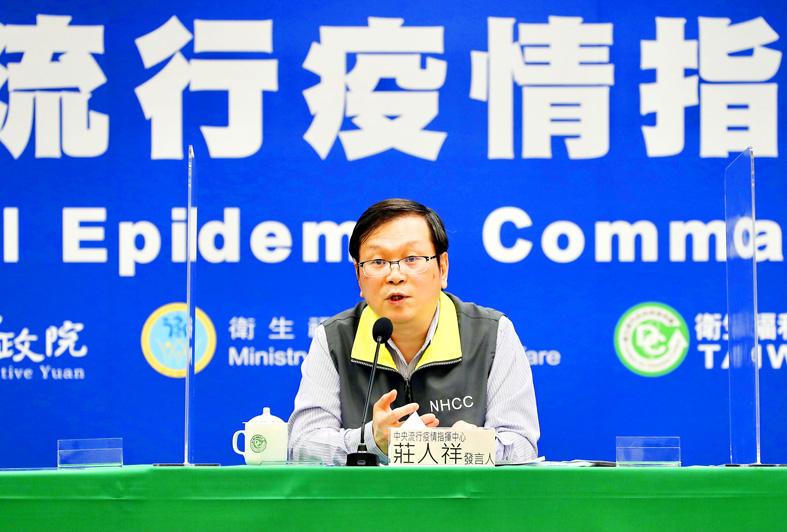Premier Su Tseng-chang (蘇貞昌) and Minister of Health and Welfare Chen Shih-chung (陳時中) are to be the first people in Taiwan to receive the AstraZeneca COVID-19 vaccine, at National Taiwan University Hospital in Taipei today, the Central Epidemic Command Center (CECC) said yesterday.
As today is the first day of COVID-19 vaccination for frontline healthcare workers most likely to have direct exposure to COVID-19 patients, Su yesterday said he had asked the CECC specialist advisory panel for an assessment and that he would get a shot of the AstraZeneca vaccine today.
The panel last week suggested that Su and Chen take the lead in the nation’s inoculation drive to reassure the public that the vaccine is safe, as concerns were raised after a few countries partially suspended AstraZeneca vaccinations due to some reported cases of blood clots.

Photo: CNA
At the CECC’s news conference, Centers for Disease Control (CDC) Deputy Director-General Chuang Jen-hsiang (莊人祥), who is the CECC’s spokesman, confirmed that Su and Chen would arrive at the hospital at 7:40am to be vaccinated.
Asked whether Su, who is over 65, should receive the vaccine, Chuang said the AstraZeneca vaccine is not being given to people aged 65 or older in some countries, because there were fewer older participants in the vaccine’s clinical trials.
However, the AstraZeneca vaccine is being offered to people aged 65 or older in the UK and some European countries, as well as South Korea, which initially had not approved the vaccine for the age group, he said.
So far there have been no abnormal effects reported after vaccination in this age group, he added.
The CECC on Friday held an online meeting with local health departments and 57 hospitals that would be offering the vaccine to explain the vaccination procedure, Chuang said.
An Advisory Committee on Immunization Practices meeting was also held on Friday, and the specialists decided to include a few precautionary tips recommended by the European Medicines Agency in the consent form for COVID-19 vaccination in Taiwan, he said.
Asked about a report by Shanghai health authorities that a traveler from Taiwan who arrived in the city on Wednesday was confirmed to have COVID-19 yesterday, Chuang said the center has contacted authorities in Shanghai for more details, but there has been no response yet.
Separately yesterday, the CECC reported an imported case of COVID-19.
The case is a Taiwanese who traveled to Poland for business in November last year, Chuang said.
He returned to Taiwan on Feb. 25 and was quarantined at a hotel because he did not show any symptoms upon arrival, he said.
However, the man on March 1 said he had developed a mild cough, but did not report it to the local health department, as he thought the symptom was not serious.
Chuang said the man returned home on March 10 and continued to practice self-health management, and the result of a paid COVID-19 test on Friday came back positive yesterday.

AGING: As of last month, people aged 65 or older accounted for 20.06 percent of the total population and the number of couples who got married fell by 18,685 from 2024 Taiwan has surpassed South Korea as the country least willing to have children, with an annual crude birthrate of 4.62 per 1,000 people, Ministry of the Interior data showed yesterday. The nation was previously ranked the second-lowest country in terms of total fertility rate, or the average number of children a woman has in her lifetime. However, South Korea’s fertility rate began to recover from 2023, with total fertility rate rising from 0.72 and estimated to reach 0.82 to 0.85 by last year, and the crude birthrate projected at 6.7 per 1,000 people. Japan’s crude birthrate was projected to fall below six,

Conflict with Taiwan could leave China with “massive economic disruption, catastrophic military losses, significant social unrest, and devastating sanctions,” a US think tank said in a report released on Monday. The German Marshall Fund released a report titled If China Attacks Taiwan: The Consequences for China of “Minor Conflict” and “Major War” Scenarios. The report details the “massive” economic, military, social and international costs to China in the event of a minor conflict or major war with Taiwan, estimating that the Chinese People’s Liberation Army (PLA) could sustain losses of more than half of its active-duty ground forces, including 100,000 troops. Understanding Chinese

SELF-DEFENSE: Tokyo has accelerated its spending goal and its defense minister said the nation needs to discuss whether it should develop nuclear-powered submarines China is ramping up objections to what it sees as Japan’s desire to acquire nuclear weapons, despite Tokyo’s longstanding renunciation of such arms, deepening another fissure in the two neighbors’ increasingly tense ties. In what appears to be a concerted effort, China’s foreign and defense ministries issued statements on Thursday condemning alleged remilitarism efforts by Tokyo. The remarks came as two of the country’s top think tanks jointly issued a 29-page report framing actions by “right-wing forces” in Japan as posing a “serious threat” to world peace. While that report did not define “right-wing forces,” the Chinese Ministry of Foreign Affairs was

US President Donald Trump in an interview with the New York Times published on Thursday said that “it’s up to” Chinese President Xi Jinping (習近平) what China does on Taiwan, but that he would be “very unhappy” with a change in the “status quo.” “He [Xi] considers it to be a part of China, and that’s up to him what he’s going to be doing, but I’ve expressed to him that I would be very unhappy if he did that, and I don’t think he’ll do that. I hope he doesn’t do that,” Trump said. Trump made the comments in the context